- Home
- Mario Puzo
The Making of the Godfather Page 6
The Making of the Godfather Read online
Page 6
With his father out of sight, Sonny crouched in a shadow and waited, but after only a second he was moving again, tearing across a cobblestone street and down a garbage-strewn alley. He couldn’t have told you precisely what he was thinking beyond that there might be a back entrance and maybe he’d see something there—and indeed when he came around behind the back of Murphy’s he found a closed door with a curtained window beside it and yellowish light shining out to the alleyway. He couldn’t see anything through the window, so he climbed onto a heavy metal garbage pail on the other side of the alley and from there he leapt to the bottom rung of a fire escape ladder. A moment after that he was lying on his stomach and looking down through a space between the top of the window and a curtain into the back room of Murphy’s Bar. The room was crowded with wooden crates and cardboard cartons, and his father was standing with his hands in his pockets and speaking calmly to a man who appeared to be tied to a straight-back chair. Sonny knew the man in the chair. He’d seen him around the neighborhood with his wife and kids. The man’s hands were out of sight behind the chair, where Sonny imagined they were tied. Around his waist and chest, clothesline cord dug into a rumpled yellow jacket. His lip bled and his head lolled and drooped as if he might be drunk or sleepy. In front of him, Sonny’s uncle Peter sat on a stack of wood crates and scowled while his uncle Sal stood with arms crossed, looking solemn. Uncle Sal looking solemn was nothing—that was the way he usually looked—but Uncle Peter scowling was something different. Sonny knew him all his life as a man with a ready smile and a funny story. He watched from his perch, fascinated now, finding his father and his uncles in the back room of a bar with a man from the neighborhood tied to a chair. He couldn’t imagine what was going on. He had no idea. Then his father put a hand on the man’s knee and knelt beside him, and the man spit in his face.
Vito Corleone took a handkerchief from his pocket and wiped his face clean. Behind him, Peter Clemenza picked up a crowbar at his feet and said, “That’s it! That’s it for this bum!”
Vito held a hand up to Clemenza, instructing him to wait.
Clemenza’s face reddened. “Vito,” he said. “V’fancul’! You can’t do nothin’ with a thickheaded mick like this one.”
Vito looked at the bloodied man and then up to the back window, as if he knew Sonny was perched on the fire escape watching him—but he didn’t know. He didn’t even see the window and its shabby curtain. His thoughts were with the man who’d just spit in his face, and with Clemenza, who was watching him, and Tessio behind Clemenza. They were both watching him. The room was brightly lit by a bare lightbulb hanging from the ceiling, its beaded metal pull chain dangling over Clemenza’s head. Beyond the bolted wood door to the bar, men’s loud voices sang and laughed. Vito turned to the man and said, “You’re not being reasonable, Henry. I’ve had to ask Clemenza, as a favor to me, not to break your legs.”
Before Vito could say anything more, Henry interrupted. “I don’t owe you wops a thing,” he said. “You dago pricks.” Even drunk his words were clear and full of that musical lilt common to the Irish. “You can all go back to your beloved fucking Sicily,” he said, “and fuck your beloved fucking Sicilian mothers.”
Clemenza took a step back. He looked surprised more than angry.
Tessio said, “Vito, the son of a bitch is hopeless.”
Clemenza picked up the crowbar again, and again Vito raised his hand. This time Clemenza sputtered, and then, looking at the ceiling, issued a long string of curses in Italian. Vito waited until he was finished, and then waited longer until Clemenza finally looked at him. He held Clemenza’s gaze in silence before he turned back to Henry.
On the fire escape, Sonny pulled his hands close in to his chest and tightened his body against the cold. The wind had picked up and it was threatening to rain. The long, low howl of a boat horn floated off the river and over the streets. Sonny’s father was a man of medium stature, but powerfully built, with muscular arms and shoulders from his days working in the railroad yards. Sometimes he would sit on the edge of Sonny’s bed at night and tell him stories of the days when he loaded and unloaded freight from railroad cars. Only a madman would spit in his face. That was the best Sonny could do to reconcile something so outrageous: The man in the chair had to be crazy. Thinking that way made Sonny calmer. For a time he had been frightened because he didn’t know how to make sense of what he’d seen, but then he watched his father as once again he knelt to speak to the man, and in his posture he recognized the steady reasonable manner that he employed when he was serious, when there was something important that Sonny was to understand. It made him feel better to think the man was crazy and his father was talking to him, trying to reason with him. He felt sure that at any moment the man would nod and his father would have him turned loose, and whatever it was that was wrong would be solved, since that was obviously why they had called his father in the first place, to fix something, to solve a problem. Everybody in the neighborhood knew his father solved problems. Everybody knew that about him. Sonny watched the scene playing out below him and waited for his father to make things right. Instead, the man began to struggle in his chair, his face enraged. He looked like an animal trying to break its restraints, and then he cocked his head and again he spit at Sonny’s father, the spit full of blood so that it looked like he somehow managed to do some damage, but it was his own blood. Sonny’d seen the bloody spit shoot out of the man’s mouth. He’d seen it splatter on his father’s face.
What happened next is the last of what Sonny remembered about that night. It was one of those memories, not unusual in childhood, that are strange and mysterious at the time but then get cleared up with experience. At the time Sonny was perplexed. His father stood and wiped the spit from his face, and then he looked at the man before he turned his back on him and walked away, but only a few feet, to the back door, where he stood motionless while behind him Uncle Sal pulled, of all things, a pillowcase out of his jacket pocket. Uncle Sal was the tallest of the men, but he walked with a stoop, his long arms dangling at his sides as if he didn’t know what to do with them. A pillowcase. Sonny said the words out loud, in a whisper. Uncle Sal went behind the chair and pulled the pillowcase over the man’s head. Uncle Peter picked up the crowbar and swung it, and then whatever happened after that was a blur. A few things Sonny remembered clearly: Uncle Sal pulling a white pillowcase over the man’s head, Uncle Peter swinging the crowbar, the white pillowcase turning red, bright red, and his two uncles bent over the man in the chair doing stuff, untying the cords. Beyond that, he couldn’t remember a thing. He must have gone home. He must have gotten back in his bed. He didn’t remember any of it, though, not a thing. Everything up to the pillowcase was pretty clear, and then after that it got fuzzy before the memory disappeared altogether.
For the longest time, Sonny didn’t know what he had witnessed. It took him years to put all the pieces together.
Across Eleventh Avenue the curtain fluttered over the barbershop, and then it was yanked open and Kelly O’Rourke, framed by the window, looked down over the avenue like a miracle—a quick shock of light on a young woman’s body surrounded by black fire escapes, dirty red brick walls, and dark windows.
Kelly looked off into the darkness and touched her stomach, as she had found herself doing unconsciously again and again for the past several weeks, trying to feel some flutter of the life she knew was rooting there. She ran her fingers over the still tight skin and muscle and tried to settle her thinking, to pull together the stray thoughts careening everywhere. Her family, her brothers, they had already disowned her, except Sean maybe, so what did she care what they thought anymore? She had taken one of the blue pills at the club and it made her feel light and airy. It scattered her thoughts. In front of her there was only darkness and her own reflection in the glass. It was late and everyone was always leaving her alone all the time. She flattened her hand over her stomach, trying to feel something. Hard as she tried, she couldn’t pull her thoughts togeth
er, keep them still and in one place.
Tom stepped around Kelly and closed the curtains. “Come on, sweetheart,” he said. “What do you want to do that for?”
“Do what?” Kelly said.
“Stand in front of the window like that.”
“Why? Worried somebody might see you here with me, Tom?” Kelly put a hand on her hip and then let it drop in a gesture of resignation. She continued pacing the room, her eyes on the floor one moment, on the walls the next. She seemed unaware of Tom, her thoughts elsewhere.
Tom said, “Kelly, listen. I just started college a few weeks ago, and if I don’t get back—”
“Oh, don’t whimper,” Kelly said. “For God’s sake.”
“I’m not whimpering,” Tom said. “I’m trying to explain.”
Kelly stopped pacing. “I know,” she said. “You’re a baby. I knew that when I picked you up. How old are you anyways? Eighteen? Nineteen?”
“Eighteen,” Tom said. “All I’m saying is that I have to get back to the dorms. If I’m not there in the morning, it’ll be noticed.”
Kelly tugged at her ear and stared at Tom. They were both quiet, watching each other. Tom wondered what Kelly was seeing. He’d been wondering about that ever since she’d sauntered over to his table at Juke’s Joint and asked him to dance in a voice so sexy it was as if she were asking him to sleep with her. He wondered it again when she invited him after a few dances and a single drink to take her home. They hadn’t talked about much. Tom told her he went to school at NYU. She told him she was currently unemployed and that she came from a big family but she wasn’t getting on with them. She wanted to be in the movies. She’d been wearing a long blue dress that hugged her body from her calves to her breasts, where the neckline was cut low and the white of her skin flared in contrast to the satiny fabric. Tom told her he didn’t have a car, that he was there with friends. She told him that wasn’t a problem, she had a car, and he didn’t bother to ask how an unemployed girl from a big family has a car of her own. He thought maybe it wasn’t her car, and then when she drove them down to Hell’s Kitchen, he didn’t tell her that he’d grown up a dozen blocks from where she parked on Eleventh. When he saw her place, he knew the car wasn’t hers, but he didn’t have time to ask questions before they were in bed and his thoughts were elsewhere. The events of the night had proceeded rapidly and in a way that was foreign to him, and now he was thinking hard as he watched her. Her manner seemed to be shifting by the second: first the seductress and then the vulnerable girl who didn’t want him to leave, and now a toughness was coming over her, something angry. As she watched him her jaw tightened, her lips pressed together. Something in Tom was shifting too. He was preparing himself for whatever she might say or do, preparing an argument, preparing a response.
“So what are you anyway?” Kelly said. She backed up to a counter beside a white porcelain sink. She lifted herself onto it and crossed her legs. “Some kind of Irish-Italian mutt?”
Tom found his sweater where it was hanging on the bed rail. He draped it over his back and tied the sleeves around his neck. “I’m German-Irish,” he said. “What makes you say Italian?”
Kelly found a pack of Wings in a cupboard behind her, opened it, and lit up. “Because I know who you are,” she said. She paused dramatically, as if she were acting. “You’re Tom Hagen. You’re Vito Corleone’s adopted son.” She took a long drag on her cigarette. Behind the veil of smoke, her eyes glittered with a hard-to-read mix of happiness and anger.
Tom looked around, noting carefully what he saw—which was nothing more than a cheap boardinghouse room, not even an apartment, with a sink and cupboards by the door on one end and a cot-size bed on the other. The floor was a mess of magazines and pop bottles, clothes and candy-bar wrappers, empty packs of Wings and Chesterfields. The clothes were far too expensive for the surroundings. In one corner he noticed a silk blouse that had to cost more than her rent. “I’m not adopted,” he said. “I grew up with the Corleones, but I was never adopted.”
“No difference,” Kelly said. “So what’s that make you? A mick or a wop, or some kind of mick-wop mix?”
Tom sat on the edge of the bed. They were having a conversation now. It felt businesslike. “So you picked me up because you know something about my family, is that right?”
“What did you think, kid? It was your looks?” Kelly flicked the ashes from her cigarette into the sink beside her. She ran the water to wash the ashes down the drain.
Tom asked, “Why would my family have anything to do with this?”
“With what?” she asked, the smile on her face genuine, as if she were finally enjoying herself.
“With me taking you back here and screwing you,” Tom said.
“You didn’t screw me, kid. I screwed you.” She paused, still grinning, watching him.
Tom kicked at a pack of Chesterfields. “Who smokes these?”
“I do.”
“You smoke Wings and Chesterfields?”
“Wings when I’m buying. Otherwise Chesterfields.” When Tom didn’t say anything right away, she added, “You’re getting warmer, though. Keep going.”
“Okay,” Tom said. “So who’s car did we drive here in? It’s not yours. You don’t own a car and still live in a place like this.”
“There you go, kid,” she said. “Now you’re asking the right questions.”
“And who buys you the classy threads?”
“Bingo!” Kelly said. “Now you got it. My boyfriend buys me the clothes. It’s his car.”
“You ought to tell him to put you up in a nicer place than this.” Tom looked around as if he were amazed at the tawdriness of the room.
“I know!” Kelly joined him in appraising the room, as if she shared his amazement. “You believe this rathole? This is where I’ve got to live!”
“You ought to talk to him,” Tom said, “this boyfriend of yours.”
Kelly didn’t seem to hear him. She was still looking over the room, as if seeing it for the first time. “He’s got to hate me, right,” she asked, “making me live in a place like this?”
“You ought to talk to him,” Tom repeated.
“Get out,” Kelly said. She hopped down from the counter and wrapped herself in a sheet. “Go on,” she said. “I’m tired of playing with you.”
Tom started for the door, where he had hung his cap on a hook.
“I hear your family’s worth millions,” Kelly said, while Tom still had his back to her. “Vito Corleone and his gang.”
Tom pulled his cap down tight on the back of his head and straightened it out. “What’s this about, Kelly? Why don’t you just tell me?”
Kelly waved her cigarette, motioning for him to go. “Go on, now,” she said. “Good-bye, Tom Hagen.”
Tom said good-bye politely, and then walked out, but before he’d taken more than a couple of steps down the corridor, the door flew open and Kelly was standing in the dark hallway, the sheet she had been wearing someplace in the room behind her. “You’re not such a tough guy,” she said, “you Corleones.”
Tom touched the brim of his cap, straightening it on his head. He watched Kelly where she stood brazenly just outside her door. He said, “I’m not sure I’m entirely representative of my family.”
“Huh,” Kelly said. She ran her fingers through the waves of her hair. She looked confused by Tom’s response before she disappeared into her apartment, failing to close the door fully behind her.
Tom pulled his cap down on his forehead and started for the stairs and the street.
Sonny was out of the truck and hustling across Eleventh as soon as Tom stepped out of the building. Tom reached behind him for the door, as if he were trying to duck back into the hallway, while Sonny bore down on him, put an arm around his shoulder, and yanked him onto the sidewalk, pulling him toward the corner. “Hey, idiota!” Sonny said. “Tell me one thing, okay, pal? Are you trying to get yourself killed, or are you just a stronz’? Do you know whose girl that is you ju
st did the number on? Do you know where you are?” Sonny’s voice got louder with each question, and then he pushed Tom back into the alley. He cocked his fist and gritted his teeth to keep from knocking Tom into a wall. “You don’t have any idea the trouble you’re in, do you?” He leaned toward Tom as if he might at any moment descend on him. “What are you doing with some mick slut, anyway?” He threw his hands up and turned a small, tight circle, his eyes to the heavens, as if he were calling to the gods. “Cazzo!” he shouted. “I oughta kick your ass down a goddamn sewer!”
“Sonny,” Tom said, “please calm down.” He straightened out his shirt and arranged the sweater draped over his back.
“Calm down?” Sonny said. “Let me ask again: Do you know whose girl you were just screwin’?”
“No, I don’t,” Tom said. “Whose girl was I just screwing?”
“You don’t know,” Sonny said.
“I don’t have any idea, Sonny. Why don’t you tell me?”
Sonny stared at Tom in wonder, and then, as often happened with him, his fury disappeared. He laughed. “She’s Luca Brasi’s twist, you idiot. You didn’t know!”

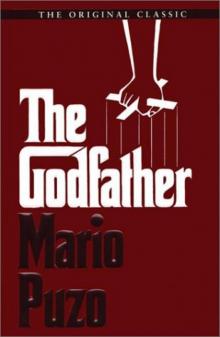 The Godfather
The Godfather The Dark Arena
The Dark Arena The Family
The Family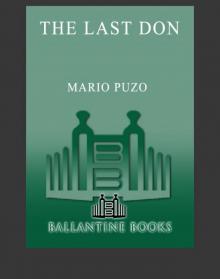 Last Don
Last Don The Sicilian
The Sicilian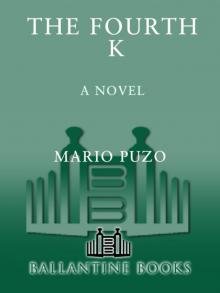 The Fourth K
The Fourth K Omerta
Omerta Six Graves to Munich
Six Graves to Munich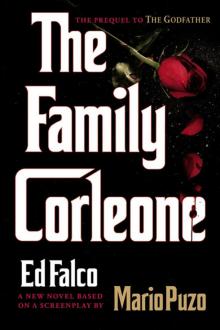 The Family Corleone
The Family Corleone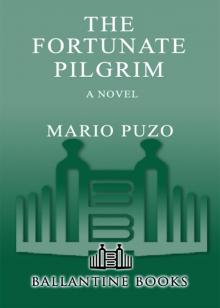 The Fortunate Pilgrim
The Fortunate Pilgrim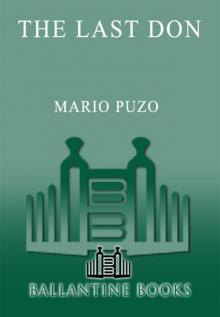 The Last Don
The Last Don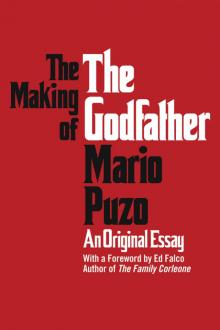 The Making of the Godfather
The Making of the Godfather Fools die
Fools die The Sicilian (v2.0)
The Sicilian (v2.0)